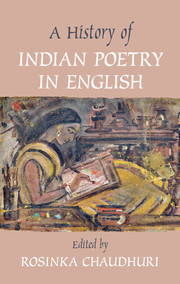Book contents
- Frontmatter
- Contents
- Contributors
- Acknowledgments
- Introduction
- SECTION I THE BROAD NINETEENTH CENTURY: INDIANS IN ENGLISH AND THE ENGLISH IN INDIA
- SECTION II PUBLISHERS, PUBLISHING HOUSES, AND THE PERIODICAL PRESS
- SECTION III POETRY: 1950–2000
- SECTION IV POETS OF THE DIASPORA
- 22 “My First, and Only, Sight”: A. K. Ramanujan and the Five Senses
- 23 U.S.-Based but India-Born: G. S. Sharat Chandra and Vijay Seshadri
- 24 “First and Foremost … A Poet in the English Language”: Agha Shahid Ali
- 25 The Languages of Diaspora: Meena Alexander, Sujata Bhatt, Imtiaz Dharker
- SECTION V THE NEW MILLENNIUM POETS ON THEMSELVES
- Bibliography
- Index
22 - “My First, and Only, Sight”: A. K. Ramanujan and the Five Senses
from SECTION IV - POETS OF THE DIASPORA
Published online by Cambridge University Press: 05 March 2016
- Frontmatter
- Contents
- Contributors
- Acknowledgments
- Introduction
- SECTION I THE BROAD NINETEENTH CENTURY: INDIANS IN ENGLISH AND THE ENGLISH IN INDIA
- SECTION II PUBLISHERS, PUBLISHING HOUSES, AND THE PERIODICAL PRESS
- SECTION III POETRY: 1950–2000
- SECTION IV POETS OF THE DIASPORA
- 22 “My First, and Only, Sight”: A. K. Ramanujan and the Five Senses
- 23 U.S.-Based but India-Born: G. S. Sharat Chandra and Vijay Seshadri
- 24 “First and Foremost … A Poet in the English Language”: Agha Shahid Ali
- 25 The Languages of Diaspora: Meena Alexander, Sujata Bhatt, Imtiaz Dharker
- SECTION V THE NEW MILLENNIUM POETS ON THEMSELVES
- Bibliography
- Index
Summary
A. K. Ramanujan died in 1993 in Chicago, an untimely death following an adverse reaction to anesthesia for minor surgery. The flag in the University of Chicago's main quadrangle flew at half-mast; Ramanujan had taught there for three decades. In his early sixties when he died, he was a towering figure in more than one academic discipline. Born to orthodox Tamil-speaking Brahmins in the Kannada-speaking princely state of Mysore and educated at the Maharaja's College, then a formidable institution of higher education, he had traveled to the United States of America on a Fulbright Scholarship as a graduate student in Linguistics. His dissertation on Kannada grammar proved enough to get him hired to the University of Chicago's growing program in South Asian Studies. It was while he was at Chicago that he published his most significant work. This included six collections of poetry: in English, The Striders (1966), Relations (1971), and Second Sight (1986); in Kannada, Hokkulalli Hoovilla (“No Lotus in the Navel”) (1969), Mattu Itara Padyagalu (“And Other Poems”) (1977), and Kuntobille (“Hopscotch”) (1990). A fourth English collection, The Black Hen, was published posthumously in his Collected Poems (1995). Chicago was also where he worked on the volumes of translation from Kannada and Tamil that made him the most influential translator of pre-modern Indian literature into English in the twentieth century, as well as the many scholarly essays on aspects of Indian literature, culture, and folklore that won him his academic reputation.
Inconveniently for the literary historian, it is possible to place Ramanujan in several literary and intellectual lineages to equally illuminating effect. He appears, with Nissim Ezekiel and Dom Moraes, as one of the founding figures in the twentieth-century tradition of (“modernist”) Indian poetry in English. He appears also (though he looms less large) as a pioneering formal experimenter in the tradition of twentieth-century Kannada poetry. He might, just as plausibly, be seen in terms of his formation against the backdrop of a modernist revolution in the twentieth-century literatures of the two Indian languages he knew best, Tamil and Kannada, in particular the Tamil poetry of Subramania Bharati, whose literary influence in the Tamil world is comparable to that of Tagore on modern Bengali literature.
- Type
- Chapter
- Information
- A History of Indian Poetry in English , pp. 347 - 360Publisher: Cambridge University PressPrint publication year: 2016



